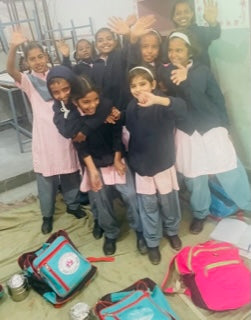Ethical & Sustainability Manifesto

The key concerns of running any business with sustainability in mind are Planet and People, our aim is to minimise our negative impact on the environment whilst maximising our positive impact on the people involved in making our clothing.

Notes on our environmental policy....
Regarding the fabric we use: • All the print cotton and rayon we use is sourced from a surplus fabric market in Delhi. Not only is this using up waste material from larger brands, it also adds to the uniqueness of our products, with small runs of patterns and many pieces being limited edition.
• Our plain cotton range is certified organic cotton from a certified supplier dyed using azo free dyes.
• All our silk items are made from recycled silk saris, we never use new silk.
• All polyester items are made from recycled polyester saris, giving discarded items a new life.• We minimise waste within the factory by using all scraps to make patchwork items, hair bands & scrunchies - nothing is wasted.



Our packaging & uk office policy:
• We minimise the amount of packaging used - nothing is individually wrapped, any packaging used in the original shipping of our products is reused for our wholesale orders.
• Our mail order envelopes are recycled and biodegradable, smaller items go in 100% plastic free eco mail bags, larger items are sent in grey recycled mailbags that can be recycled again.
• All of our marketing is printed on recycled paper and card (flyers, catalogues, hang tags, etc).
• We use a sustainable energy supplier to power our uk office.
• We donate to a rainforest planting scheme directly from every purchase made on our website.


Notes on our ethical policy...
Who makes our Clothing:
• Our clothing is produced in Rajasthan, India; everything is made to fair trade standards. We visit the factory annually, I have been working closely with the family that runs this factory for over 15 years and their business has grown alongside mine. The factory provides clean safe working conditions and the staff have regular breaks and holidays. There is a very low staff turnover which is a sign of a positive, stable and safe work place. The machinists are paid per garment, which is standard practice in the industry, and they can earn a good wage. Please see my social media from my most recent trip for up to date images of the factory and everyone involved in making your clothes. Our clothing is made in small regular batches ensuring year round employment (rather than machinists working round the clock at the start of the season and then not having work in the quieter periods). We regularly pay advances to the factory so no debt is incurred when sourcing fabrics and to ensure all wages are paid on time.
• Our Guatemalan handicrafts are made by workers who produce the goods at home in their spare time, often alongside agricultural work, and then sell them through a cooperative I buy from. Their mission statement is:
"Two hearts one dream, that's how it all started and today, after 35 years, we are a team of more than 300 talented Maya artisans who work side by side to create amazing and colourful handmade items, many of which are one of a kind. With trust, mutual respect and honest production we are committed to sharing with the rest of the world our Maya culture through our stunning textiles. Your purchase allows us to contribute directly to the livelihood and sustainability of our artisans families and indigenous communities."
• Our Nepalese goods are from factories that I have visited and inspected personally to check working conditions and meet the producers of our products.
• Our brass jewellery is made in a small family owned factory in Eastern Rajasthan.



What else can we do?• Alongside this we support girls education in India through our sponsorship of a student at the Fior di Lotto Foundation. This year we gave an extra donation to buy a sewing machine for their sewing school project, in previous years we have given additional donations to support other programs they run through the school, such as food distribution during covid, and medical care and post natal support for new mothers.
• I am a member and supporter of The Circle NGO, a charity founded by Annie Lennox to promote global feminism and gender equality, one of their major campaigns is The Living Wage Campaign for Garment Workers.
• We take part in regular fundraising and social media campaigns for various charities and causes, specifically focusing on sustainability and ethics within the garment industry.


